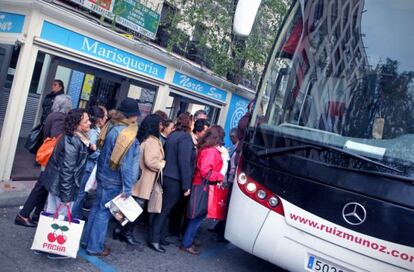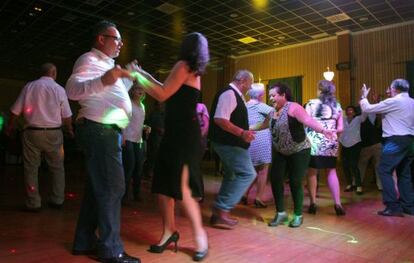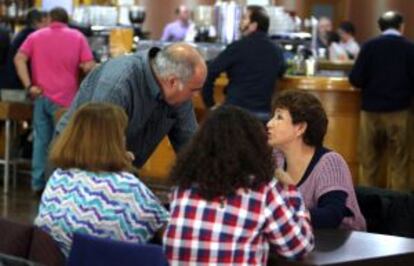Spain’s caravans of singles
The tradition of bussing out women to visit rural bachelors is holding out in the digital age


They have come from all over Madrid, and hail from different countries. They range in age from barely 30 to past 60. At 9am on a fall morning, around 50 women board a bus after paying €20 to join what has been advertised as a “caravan of love.”
Later in the day, the bus will arrive at a hotel on the outskirts of Mérida, in Extremadura province, where men from outlying villages looking to find themselves a wife or girlfriend will have paid €60 to dine, dance and talk to them.
Finding a boyfriend is more difficult, but you’ll make girlfriends”
The first event aimed at bringing single women from Spain’s cities into contact with rural bachelors was organized 30 years ago, and despite the growing popularity of online dating, it refuses to die. The bus is full. “Let’s go get ’em!,” rallies Miriam, a Colombian who has taken part in many such outings over the years.
Marlene is an Ecuadorian woman in her mid-fifties. This is her first time aboard the “caravan of women,” as the Spanish media has dubbed the phenomenon.
“I have lived in Spain for 14 years and I’ve never been anywhere,” she says. “I look after old people and everything I earn goes to my children. This is the first thing I have done for myself.”

Graciela, a Colombian woman 10 years older, has been taking part in these trips for 14 years. María Luisa, a Spaniard, has just realized what this is all about. “Where are you taking me?” she asks her friend María Isabel, a 64-year-old widow who had told her they were going to visit Toledo.
Venecia, one of the organizers of the trip, announces over a microphone: “This is going to be the best day of our lives, whether there are any men or not, although there will be, because everybody in the area has been warned that we’re coming.”
Elisabeta, a Romanian, looks fearful. She works as a live-in domestic assistant all week, and all she really wants to do later on is dance.
3,000 women, 60 couples
Venecia Alcantara is from the Dominican Republic. She met her husband, Manolo, on just such a trip 20 years ago. Since then, she has helped plan many others. She says her own story is the best advertisement for her business.
“Around 3,000 women have passed through here. Since 1996 we have organized around 350 trips, resulting in about 120 couples. Many have since split up, but there are around 60 still together.
“I was invited to two weddings,” says Manolo, who works for the post office, and organizes trips in his spare time. “I make around €200 on each trip, but thanks to these caravans I have been just about everywhere in Spain.”
The children of the caravan
“I’m here thanks to that caravan,” says José Serveto, the mayor of Plan, a tiny community in the Pyrenees.
His parents, José, from the village, and Maximina, who lived in Valencia, met during the three days that the first single ladies trip lasted, back in 1985. They were married six months later and have been together ever since.
“They have two anniversaries: the wedding and the caravan. My mother was then 29 and my dad was 41.”
A dozen or so marriages and their corresponding children were the result of that first caravan of women.
“There were three buses and they were all packed,” remembers Maximina. “The whole village was waiting to see us. They even arranged a concert.”
After writing to each other for six months and meeting in person a couple of times, José, a cattle farmer, traveled to Valencia to ask her father for permission to marry.
“It was difficult leaving the city for the village, but I was swept up in it all. He’s very romantic.”
At a time when there are dating applications for smartphones and dozens of websites promise to find you the ideal partner by using complex algorithms – some, like Singld, are investing millions of dollars to bring people together based on their genetic codes – this old-school approach still has its appeal.
“The internet-based dating sites are not our competitors, because we’re operating in different markets. These are people who like to do things face to face,” says Manolo.
The first trip to a village of 150 inhabitants in the Pyrenees called Plan was a resounding success. The idea came up in the local bar after the village’s bachelors watched Westward the Women, a 1951 Hollywood western about a plan to take women out to the Wild West.
So they put out an advertisement in a regional newspaper: “Women aged between 20 and 40 needed for matrimonial purposes in Pyrenean village in Aragon.” The rest is history.
The idea behind the early caravans was rural repopulation, and Manolo insists that this is still the goal of trips to out-of-the-way villages such as Castillejo de Mesleón, Villaseco del Pan, Villa de Fuentidueña, El Pedernoso and Gárgoles de Arriba. But he also admits that not many women want to move from a city to a small village.
Isabel, who is taking part in her third such trip and has brought along six friends, says that even if she were to meet somebody interesting – “which isn’t that likely, given that it’s the young women they’re all interested in” – the most likely outcome would be a telephone relationship with the occasional visit. “They want you to move to these villages, but I’m not going to do that.”
They want you to move to these villages, but I’m not going to do that”
“This is your captain speaking,” says José, the driver, making a much-needed interruption of the non-stop reggaeton that has been blasting out of the sound system for the last five hours. “There are 18 minutes to landing. Start brushing your hair.” The women get their makeup out.
We arrive at Romero Hotel, a three-star place four kilometers from Mérida. The reception party is a disappointment: there are five men waiting by the door.
“The last time we were here we were given bouquets. There were a lot of men, but €60 is a lot of money,” says one woman. “There’s a crisis,” explains Manolo. The caravan visited the hotel in April. Perhaps the controversy helped attract more people back then.
“We brought a sign that said: ‘Caravan of women, the first 55 bachelors are guaranteed the company of single women,’” recalls José Romero, the hotel owner. “And the next thing you know, the feminists were all over us. They even painted ‘caravana machista’ [caravan of male chauvinists] on the bus. But the men had paid their €60 and we had to offer them something.”

Julio, a 37-year-old from Calamonte, is happy about the ratio of men to women. “I don’t like the internet, it’s very cold. And I’m not going to let anybody else know about this.” He’s interested in Lupita, a 44-year-old he met back in April. “We’ve been talking on the phone since then. I’m very much in love. I’m going to ask her to marry me.”
His courtship of Lupita keeps her friends amused for the evening. At one point he gets down on one knee to ask her to marry him while the others applaud. She laughs and says that without an engagement ring there’s no engagement. When she dances later on with another man, Julio seems to finally get the message. Fernando is less ambitious: “I would like to make friends, receive messages in the morning… somebody who cares about me.”
“They’re shy”
After dinner, a metamorphosis takes place. From the oversized bathrooms of this roadside hotel a procession of cleavage emerges. María Isabel and María Luisa are now wearing elegant evening dress, complete with pearl necklaces. On stage, the singer looks like she’s decked out in a female Santa Claus outfit.
Finally, the men appear – by this time they don’t have to pay €60. Just as Bea had warned at the beginning of the trip, they’re shy. But the dance floor fills up in direct proportion to the amount of drinks the waiters begin serving.
But there are still too many women to men. Some of the women remain sitting down until 3.30am, when the bus finally returns to Madrid, tapping their feet as they watch the others dance. As somebody pointed out at the beginning of the trip: “Finding a boyfriend is more difficult, but you’ll make girlfriends. Worst case scenario, you’ve paid €20 for a trip, a lunch and dinner.”
Tu suscripción se está usando en otro dispositivo
¿Quieres añadir otro usuario a tu suscripción?
Si continúas leyendo en este dispositivo, no se podrá leer en el otro.
FlechaTu suscripción se está usando en otro dispositivo y solo puedes acceder a EL PAÍS desde un dispositivo a la vez.
Si quieres compartir tu cuenta, cambia tu suscripción a la modalidad Premium, así podrás añadir otro usuario. Cada uno accederá con su propia cuenta de email, lo que os permitirá personalizar vuestra experiencia en EL PAÍS.
¿Tienes una suscripción de empresa? Accede aquí para contratar más cuentas.
En el caso de no saber quién está usando tu cuenta, te recomendamos cambiar tu contraseña aquí.
Si decides continuar compartiendo tu cuenta, este mensaje se mostrará en tu dispositivo y en el de la otra persona que está usando tu cuenta de forma indefinida, afectando a tu experiencia de lectura. Puedes consultar aquí los términos y condiciones de la suscripción digital.








































